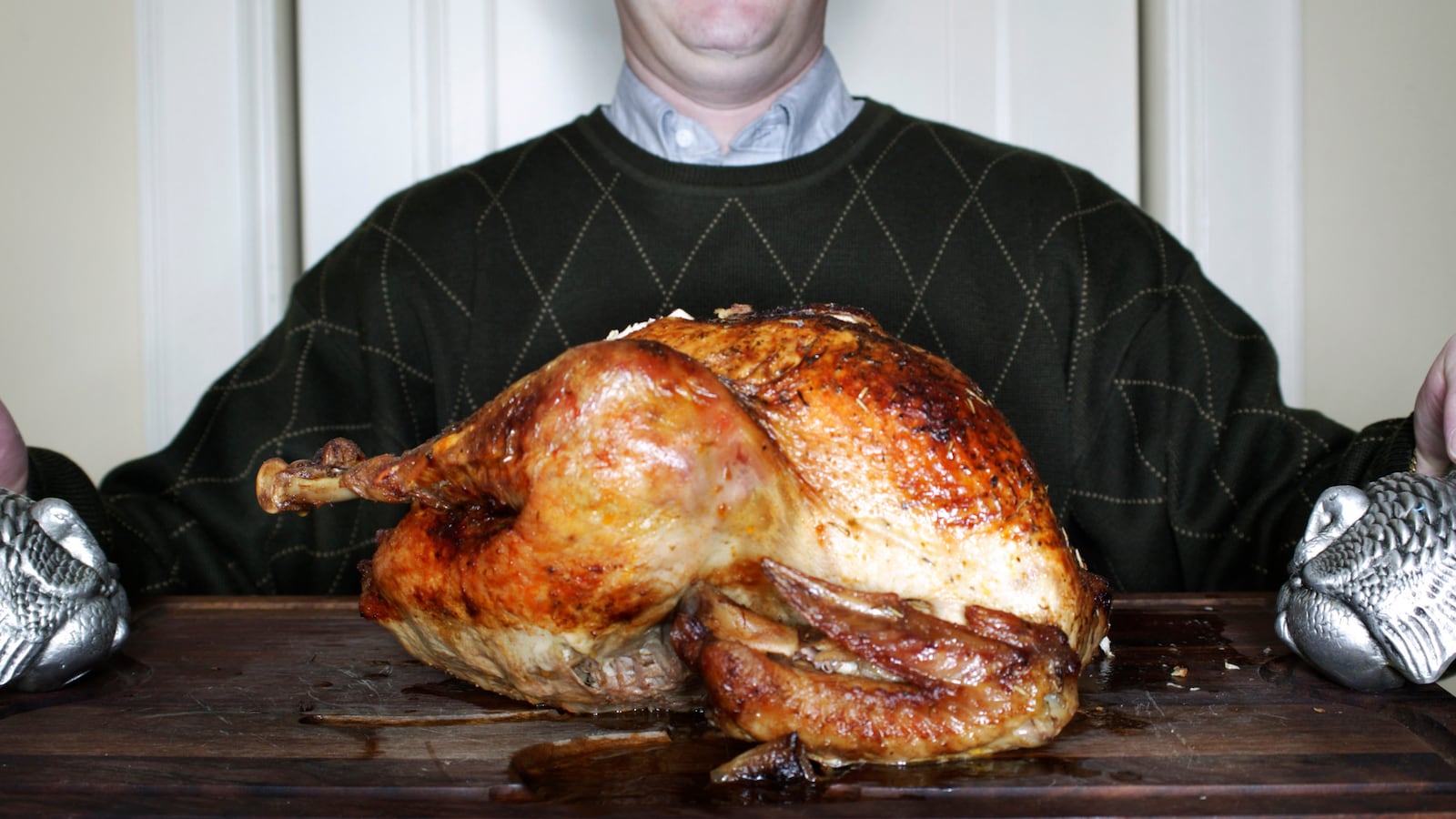Thanksgiving is the one comfy American holiday. There are no gifts or tips of the hat toward some complex religious custom. Participants are expected simply to wander in and chat with relatives they suddenly can tolerate, to smile at in-laws, to play or watch or actively avoid football. And to eat—this is the holiday for people who like to eat and eat more. It’s expected. It’s demanded.
Given its limited agenda, Thanksgiving has few myths or stories that surround it. Grandpa doesn’t talk about his first Thanksgiving in the New World; no one discusses the miracle of the one yam that fed 300 people on a mountain somewhere; there are no songs to be sung or heroes to be noted. It’s all business, really—the business of overeating.
Indeed, the only myth about Thanksgiving, not counting our averred friendliness toward Native Americans, is an odd one: that the Thanksgiving meal, alone among other pig-out sessions, can make a person sleepy. Yep, not only does Thanksgiving give the green light to overeating, it also signals two thumbs up to those who need to catch a 45-minute nap on the couch right after the meal.
The “turkey means sleep” trope has been with us a while and has been debunked for just about the same duration but is still worth reviewing. The premise is this: turkey is chock-full of a soporific essential amino acid, tryptophan, one of the 22 essential amino acids. These amino acids are “essential” because our body cannot synthesize them; to maintain a blood level, we have to ingest tryptophan daily. So tryptophan at pretty big doses is a routine part of being a human on planet Earth. Despite this relatively stable homeostasis, a dose of turkey is somehow said to be enough to tip the scales of tryptophan toward hypnotic, dream-laden sleep.
To be sure, tryptophan as a white pill, not a slab of white meat, is used by some as a sleeping aid. Few studies, though, demonstrated efficacy, and the medical dose given is way above what even a total slob would choke down at the Thanksgiving table. But this is only one of the many bits of faulty reasoning in the trypto-myth. One of the clearest debunkings of turkeys-‘n’-sleep, from last year, features the comparative tryptophan content of various foods and points out that cheese and ham pack as much trypto-wallop as the big bland bird.
A more complete list of tryptophan content in food is even on Wikipedia, which notes the dose in everything from dried cod (0.7 grams of tryptophan per 100 grams of food) to soybeans (0.59 grams) and cheddar cheese (0.32 grams). Each is more potent than turkey (0.24 grams); indeed, chicken, beef, and salmon all have about the same amount as turkey, though a nice chicken dinner has never been associated with sleep. Praying for sleep, perhaps, but the right to conk out near the table? No way. For those who need the myth not only scientifically disproved but ground cruelly into the pavement, try the Mythbusters show, “Trypping Out.”
So why do we persist in observing the tryptophan and turkey and sleep version of the Thanksgiving? After all, Thanksgiving is the great American holiday, the perfect Rockwell moment, as American as apple (or the odious pumpkin) pie. Aren’t we strong enough to handle the truth, especially on this the day of gathering together to ask the Lord’s blessing? Probably not—the tryptophan story provides us with the perfect cover for the real reason we so love the holiday.
Much of Thanksgiving’s enduring popularity derives from its consummate un-American-ness, celebrating the cardinal sins first and foremost. Thanksgiving is about sloth and gluttony, as well as a dash of envy and greed. (Lust is tamped down, though, by the extra helping of that brown gravy-lined libido-suppressing dish Aunt Lisa’s neighbor bought at a local farm.) As such, it provides us with a break from the usual all-American goody-two-shoes lineup of truth and justice, those old bores, and reconnects us with our mischievous Huck Finn roots, where nothing says patriotism more than a good snooze.






